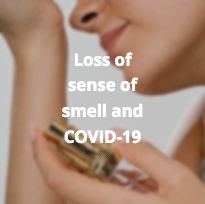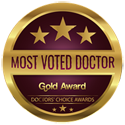 Sudden loss of smell was recognized as one of the earliest and most reliable predictors of COVID-19. In fact, over 75% of those afflicted with COVID-19 experienced complete or partial smell loss.
Sudden loss of smell was recognized as one of the earliest and most reliable predictors of COVID-19. In fact, over 75% of those afflicted with COVID-19 experienced complete or partial smell loss.
Imagine for the moment that you have no sense of smell. At first, you might consider it a minor annoyance. You wouldn’t be able to smell a flower garden or the bouquet of your favorite pinot noir. But losing your sense of smell isn’t just a quality of life problem. Having an impaired sense of smell can be dangerous. How would you smell a gas leak or a house fire? How would you know if the milk you were about to pour on your cereal was sour?
Anosmia or loss of the sense of smell can have even more profound implications. Your sense of smell is closely linked to your sense of taste. If you can’t smell your food, you can’t enjoy it or even identify it with any certainty. For many, being cut off from the intimacy and companionship that comes with eating, cooking, and feeding, is a profoundly difficult loss to bear. Furthermore, parosmia (smell distortions that many patients experience as the sense of smell “re-wires”) can interfere with appetite, and further alienate people from food. For those who have a smell/taste disorder from COVID-19, and the nearly two million Americans who suffered from it prior to COVID-19, the world becomes a less joyful and far more dangerous place.
While many may recover spontaneously within weeks or months, some do not. For 10% to 20% of people, their smell loss is persistent, and it can be months before they even begin to recover. So, for those who do not show early signs of spontaneous recovery, the question is, what can be done? Luckily, the olfactory system has the capacity to regenerate. Dr. Yagoda recommends “smell training” for all patients with anosmia. This significantly amplifies (and often doubles) the rate of recovery. Guided olfactory training is a deliberate, active, contemplative smelling process used to support the regeneration of olfactory neurons, forge new neural pathways and reinforce existing ones.
Dr. Yagoda also recommends a novel olfactory therapy conceived of by her patient, Leah Holzel, who was a trained culinary professional, food journalist and researcher. She personally suffered anosmia in 2016 after an upper respiratory infection, and began a smell training program recommended by Dr. Yagoda immediately thereafter. She later become an expert in one-on-one counseling to help others navigate the loss of sense of smell. This intervention advocates a culinary approach to anosmia that supports a positive reconnection with food in the absence of flavor, and/or during the challenges caused by parosmia. This approach was extensively researched and peer-reviewed by two flavor scientists, Alexander Fjaelstad. M.D and Robert Pellegrino, PhD, and by Professor Thomas Hummel, one of the world’s leaders in both basic and clinical olfactory research. (A publication and cookbook on smell loss and the flavor system currently is in contract with Columbia University Press.) Dr. Yagoda can connect those suffering from loss of smell with Ms. Holzel for one-on-one counseling.
Loss of the sense of smell can be a presenting sign of COVID-19 infection. If you’re experiencing an altered or diminished sense of smell or a complete loss of sense of smell, your first step should be to call an otolaryngologist like Dr. Yagoda, who specializes in the care of the ear, nose, and throat. Dr. Yagoda has been committed to educating and empowering you and to providing you with outstanding health, wellness, safety and beauty advice, goods and services for the last 25 years. There is good reason that Dr. Yagoda is the one other doctors choose when they want the very best. Call us at 212.434.1210 or email us at info@DrYagoda.com to schedule your telemedicine consultation. And, read this article for ongoing research.
Additional resources:
- Abscent – For ending smell disorders
- Fifth Sense – Long Covid Hub
- The Smell and Taste Association of North America (STANA)
- The Monell Chemical Senses Research Center in Philadelphia does not have a clinical arm but can be a resource for the latest current research on anosmia. Contact jtrachtman@monell.org































